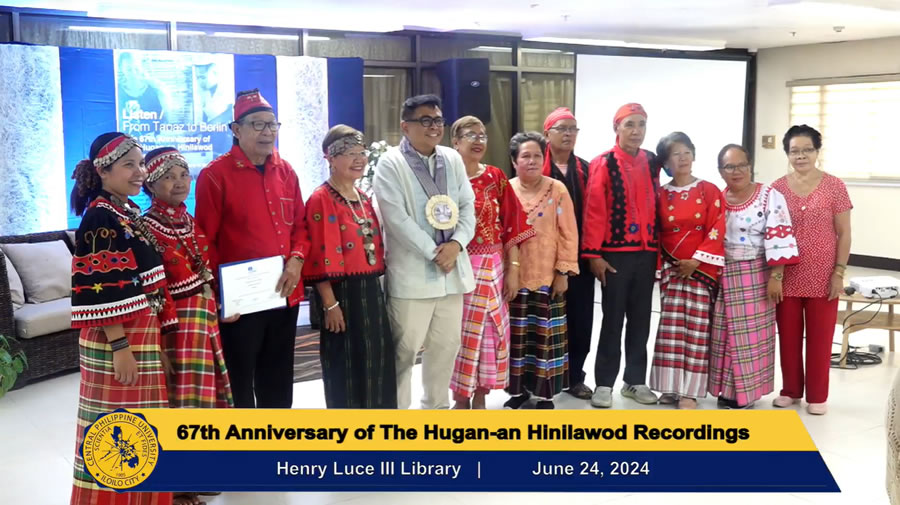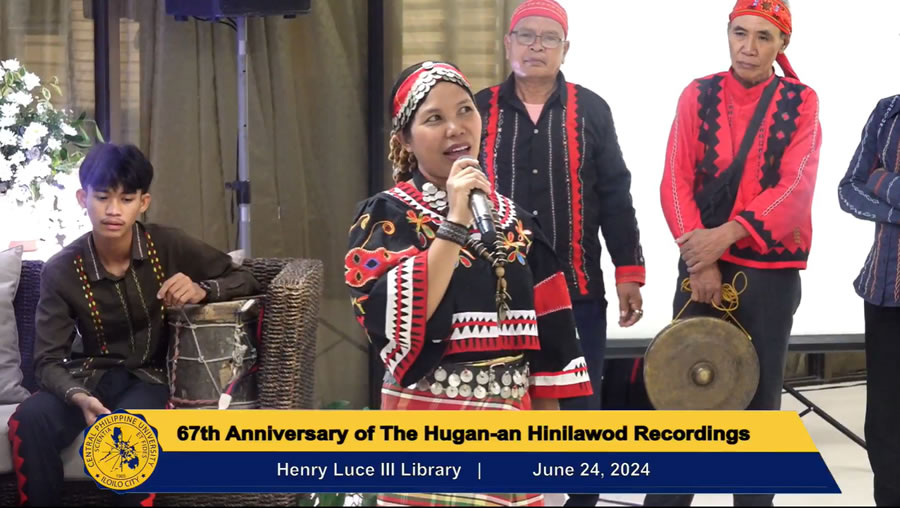By Karren Jay G. Asgar

The Panay Bukidnon community together with Dr. Ivan Anthony Henares, Secretary-General of UNESCO Philippines.
On June 24, 2024, the Central Philippine University holds the historic “Lapaz/From Tapaz to Berlin: The 67th Anniversary of the Hugan-an Hinilawod Recordings, Inscribed in the UNESCO Memory of the World” held at the Henry Luce III Library.
The Hinilawod Records of Jocano were made possible by Dr. Felipe Landa Jocano, Sr., a distinguished Centralian alumnus, as he captured these cultural treasures in audio format using a magnetic tape recorder. It serves as a collaborative effort of the Panay Bukidnon epic chanters “Ulang Udig” from Lambunao, Iloilo, and Narcisa “Hugan-an” Lingaya of Tapaz, Capiz, from 1956 to 1957. The said recordings have been preserved and housed in the Henry Luce III Library of Central Philippine University.
The event properly started with an opening prayer led by the program’s host, Dr. Margen Arandela Java. CPU President Rev. Dr. Ernest Howard B. Dagohoy delivered his welcome speech, setting a tone of respect and appreciation. “We value culture and tradition in this University. As well as the intersection of Scientia et Fides upon which the University’s delivery of educational instruction is based,” Dr. Dagohoy emphasized.

Present in the said program were descendants of the following: Ulang Udig from Lambunao, Iloilo; Iyay Inar from Tapaz, Capiz and Calinog, Iloilo; Claro Decretales from Tapaz, Capiz; and Preciosa Caballero from Calinog, Iloilo. Dr. Alicia P. Magos, Professor Emeritus, UP Visayas, Miagao, Iloilo, a former student of Dr. Felipe Jocano, Sr., and a Sugidanon Panay epic researcher, was also present during the event.
One of the highlights of the celebration were the performances by the Panay Bukidnon Culture Bearers from Garangan Calinog, Iloilo. Led by Romullo Caballero, Master Sugidanon Epic Chanter, he started their performance with a traditional prayer. It was then followed by a series of epic chants and binanog dances by Preciosa Caballero’s descendants.
Afterwards, recorded video messages from Sen. Loren Legarda; Prof. Felipe Jocano, Jr., UP Department of Anthropology and son of Hinilawod Researcher, Dr. Felipe Landa Jocano; and Liby Limoso, Shri Vishayas Project Lead Researcher and 2024 Visual Arts Fellow, DAAD Artists-in-Berlin program, graced the event with their inspirational messages. “Let us come together to pay tribute to the exceptional research of F. Landa Jocano on the remarkable stories of our epic heroes, which can be valuable materials for historians and students as these stories provide evidence of the complex social structures and the elaborate philosophical views of our pre-colonial ancestors,” Sen. Legarda said.
A keynote address was delivered by Dr. Ivan Anthony Henares, Secretary-General of UNESCO Philippines. During his message, he highlighted the rich cultural heritage and profound narratives passed down through generations and preserved in the Hinilawod Recordings. “These recordings captured stories of valor, wisdom, and intricate tapestry of human experience shared across the Asian Pacific region,” he stated. He also acknowledged the efforts of CPU in safekeeping these valuable treasures and enabling generations to journey back in time and hear the voices of the ancestors. He also awarded a Certificate of Inscription from the UNESCO Memory of the World to CPU President Rev. Dr. Ernest Howard B. Dagohoy, together with Ma. Cynthia T. Peleña, RL, MLIS, Director of Libraries. A copy of the said certificate was also handed over to the Panay-Bukidnon community.
Selected representatives from the invited descendants and culture bearers of Panay Bukidnon also shared their respective speeches and testimonies. The event ended with the closing remarks of Dr. Irving Domingo Rio, CPU Vice President for Academic Affairs.
CPU continues to promote such historical collections, even while also embracing the role in shaping the collective Centralian identity and inspiring future generations. As younger generations embrace new forms of media and communication, there is a growing urgency to ensure that these ancient narratives remain relevant and revered.
